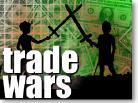|
U.S. sets Euro trade tariffs
|
 |
May 14, 1999: 1:46 p.m. ET
Levies totaling $202M a year planned unless EU rescinds ban on U.S. beef
|
NEW YORK (CNNfn) - The United States is threatening to impose about $200 million in tariffs on European goods -- including meat, cheese, flowers and scores of other products -- in retaliation for the European Union's refusal to import beef from cattle reared on artificial growth hormones.
The U.S. Department of Agriculture said Friday it plans to impose levies on European agriculture and consumer products totaling $202 million annually, equal to the amount it estimates the U.S. beef industry loses through the ban each year.
The 15-member European Union had until Thursday to end its long-running refusal to import the beef after the World Trade Organization rejected the EU's contentions that meat from hormone-treated cattle is unsafe. But the deadline passed, and the United States said Friday it will proceed with its proposed sanctions.
"Unfortunately, the EU's unwillingness to meet its international obligations leaves the U.S. with no choice," Agriculture Secretary Dan Glickman said Friday. "Starting today, we are moving ahead with steps necessary for WTO authorization to suspend trade concessions."
'A strong message'
The dispute, which began about a decade ago, is the second major trade row between the U.S. and the 15-member EU that recently has gone before the WTO.
The world body earlier approved nearly $200 million of tariffs on European exports to the United States -- products ranging from Italian pecorino cheese to Scottish cashmere sweaters -- after it ruled that EU countries shunned bananas produced by U.S. companies in Latin America in favor of imports from former European colonies in the Caribbean and Africa.
The beef trade sanctions could begin as early as mid-June, the Agriculture Department said. But the department also said it is "willing to discuss" the issue of compensation, as an interim step until the EU ends its ban.
In March, the office of U.S. Trade Representative Charlene Barshefsky issued a list of more than 80 European imports, totaling $900 million, that could be subject to increased duties of 100 percent because of the beef ban. The products include fresh and frozen meat products, tomatoes, onions, oats, chewing gum, cough drops, peaches and grape juice.
"The list is designed to send a very strong message to the European Union, but the final list -- whenever it comes out -- will be designed to minimize impact to U.S. importers and U.S. consumers," a Trade Representative spokesperson told CNNfn. The official, who declined to be named, also noted that the preliminary list will be whittled down significantly before the final one is released in June.
EU trade officials didn't return calls from CNNfn requesting comment.
The U.S. action is justified, observed Allan Mendelowitz, vice president of the Washington-based Economic Strategy Institute, a nonprofit think tank. "No one forces the Europeans to eat our beef," he said "If there's someone there as a consumer who believes it's a health risk, they don't have to buy it."
But the latest dispute, as well as the banana row, points out a major problem with the World Trade Organization's conflict resolution mechanisms, he said.
Slapping the EU with a penalty "doesn't further the efficiency of markets," he said. "It reduces everyone's welfare. The desired response is the EU taking prompt and corrective action."
The European beef ban first went into effect in 1989. Thursday, the National Cattlemen's Beef Association urged that the sanctions proceed, saying the EU has spent 10 years formulating "stall and delay tactics."
The cattle industry insists that the hormones help cattle produce more meat and less fat, and all beef naturally contains hormones. 
|
|
|
|
|
 |

|

